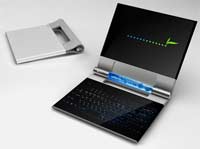The Russian scientists have created a battery for laptops for ten hours of continuous work. The block represents a fuel cell created using nanotechnologies. According to scientists, by the end of 2009 fuel cells will be launched into production with a 10 thousand unit monthly output. The project has become international.
The Russian scientists have created a laptop battery for 8-10 hours of continuous work, Lev Trusov, professor, doctor of engineering, director general of the Aspect Association, which is the vendor of the mentioned above battery, reports to N&I Agency Novosti.
‘We begin to develop and organize production of an autonomous source of current for laptops. The given battery should operate for ten hours under 20W load. That is a real scientific and market breakthrough based on domestic developments’, - said Mr. Trusov at the Second International Hydrogen Forum that opened in Moscow the other day.
The new battery has been developed on the basis of the so called fuel cells, which differ from ordinary batteries by substances for electrochemical reactions to come from outside. Such a battery life is unlimited (it works till it is provided with a substance for reaction, i.e. methanol, or hydrogen) and it needs no reloading like accumulators.
One of the most important constituents of fuel cells is a porous membrane with a catalyst, which participates in the fuel decomposition reaction and electric current production. The narrower the membrane pores, the larger the contacting area with the catalyst, the smaller the element might be. The New block membrane has been developed by the Russian scientists using the so called gradient porous matrix nanostructures. Mr. Trusov believes the battery for a modern laptop should weigh no more than 100-150 grams. A thin multi-layer nanostructure used in the Russian scientists’ invention resolves the issue of high energy concentration density per unit volume. The specific power is 180 MW per square centimeter. Moreover, developers have done their utmost to make the battery harmless for users.
Mr. Trusov says an agreement to arrange the joint product production has been signed between the Russian Plant Tenzor and the US Company Medis Technology in Dubna. Medis Technology is known for creation and production of a portable battery on the basis of an alkaline fuel cell for mobile devices.
According to Mr. Trusov, the battery will be set for production in lines. ‘We plan to produce 10 thousand units a month by the end of next year’, - says the scientist. The plant in Dubna is expected to produce about 100 thousand batteries for laptops a year.
The Aspect project has been selected by the International Partnership for Hydrogen Economy – IPHE – and included into IPHE program as an international project.

